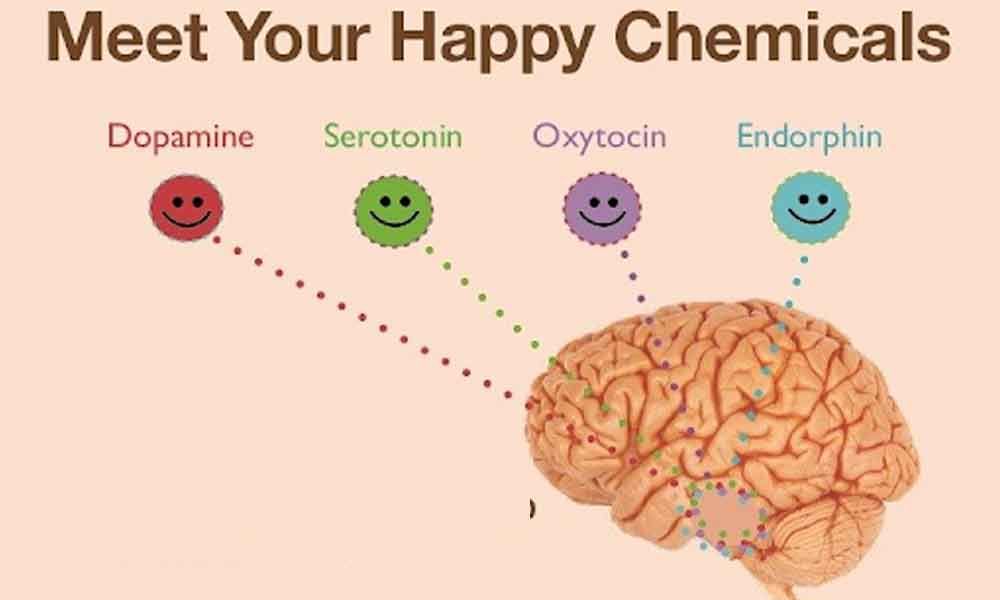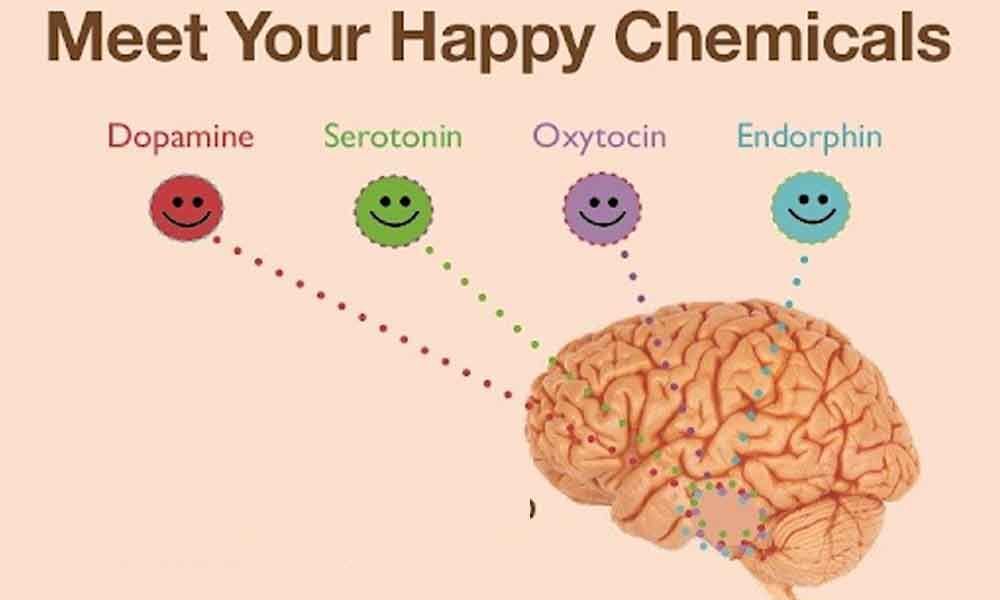Learn about brain health and nootropics to boost brain function
Let’s hack the happy chemicals – Dopamine, Serotonin and Endorphins


How many books, courses, and seminars have been held every year with the ultimate objective being to help you become happier and more fulfilled?
How many books, courses, and seminars have been held every year with the ultimate objective being to help you become happier and more fulfilled?
What if implementing these mindset strategies isn't enough?
What if there is a much more foundational issue starting in our brain? Your brain is the house your mind lives and issues in the brain manifest themselves with symptoms in our mood, feelings, thoughts, and even behaviours.
When it comes to happiness and your brain, we can't go any further without talking about Serotonin.
Serotonin is your "Happy Neurotransmitter," allowing you to feel happy, calm, and fulfilled. Neurotransmitters are what your brain uses to communicate from brain cell to brain cell. Without the proper levels of neurotransmitters, our brain is trying to operate with limited resources.
Can we hack our own happiness, or at least increase our likelihood of achieving happiness, by increasing our levels of serotonin naturally?
Hormones are chemicals produced by different glands across your body. They travel through the bloodstream, acting as messengers and playing a part in many bodily processes.
One of these important functions? Helping regulate your mood.
Certain hormones are known to help promote positive feelings, including happiness and pleasure.
These "happy hormones" include:
Dopamine: Also known as the "feel-good" hormone, dopamine is a hormone and neurotransmitter that's an important part of your brain's reward system. Dopamine is associated with pleasurable sensations, along with learning, memory, motor system function, and more.
Serotonin: This hormone (and neurotransmitter) helps regulate your mood as well as your sleep, appetite, digestion, learning ability, and memory.
Oxytocin: Often called the "love hormone," oxytocin is essential for childbirth, breastfeeding, and strong parent-child bonding. This hormone can also help promote trust, empathy, and bonding in relationships, and oxytocin levels generally increase with physical affection like kissing, cuddling, and sex.
Endorphins: Endorphins are your body's natural pain reliever, which your body produces in response to stress or discomfort. Endorphin levels also tend to increase when you engage in reward-producing activities, such as eating, working out, or having sex.
Here's a look at how to make the most of these natural mood-boosters.
Get outside
Looking to boost your endorphins and serotonin levels? Spending time outdoors, in sunlight, is a great way to do this.
According to 2008 researchTrusted Source, exposure to sunlight can increase production of both serotonin and endorphins.
Start with at least 10 to 15 minutes outside each day. If you're tired of the same old sights, try exploring a new neighborhood or park. (Just don't forget sunscreen!)
Make time for exercise
Exercise has multiple physical health benefits. It can also have a positive impact on emotional well-being.
If you've heard of a "runner's high," you might already know about the link between exercise and endorphin release.
But exercise doesn't just work on endorphins. Regular physical activity can also increase your dopamine and serotonin levels, making it a great option to boost your happy hormones.
Maximize your workout
To see even more benefits from exercise:
Include a few friends. A small 2009 studyTrusted Source looking at 12 men found evidence to suggest group exercise offers more benefits than solo exercise.
Get some sun. Move your workout outdoors to maximize your serotonin boost.
Time it. Aim for at least 30 minutes of aerobic exercise at a time. Any amount of physical activity has health benefits, but research associates endorphin release with continued exercise rather than short bursts of activity.
Laugh with a friend
Who hasn't heard the old saying, "Laughter is the best medicine"?
Of course, laughter won't treat ongoing health issues. But it can help relieve feelings of anxiety or stress, and improve a low mood by boosting dopamine and endorphin levels.
According to a small 2017 studyTrusted Source looking at 12 young men, social laughter triggered endorphin release. Research from 2011Trusted Source supports this finding.
So, share that funny video, dust off your joke book, or watch a comedy special with a friend or partner.
An added bonus? Bonding over something hilarious with a loved one might even trigger oxytocin release.
Cook (and enjoy) a favorite meal with a loved one
This tip could — in theory — boost all 4 of your happy hormones.
The enjoyment you get from eating something delicious can trigger the release of dopamine along with endorphins. Sharing the meal with someone you love, and bonding over meal preparation, can boost oxytocin levels.
Certain foods can also have an impact on hormone levels, so note the following when meal planning for a happy hormone boost:
spicy foods, which may trigger endorphin release
yogurt, beans, eggs, meats with low-fat content, and almonds, which are just a few foods linked to dopamine release
foods high in tryptophan, which have been linked to increased serotonin levels
foods containing probiotics, such as yogurt, kimchi, and sauerkraut, which can influence the release of hormones
Try supplements
There are several supplements that may help increase your happy hormone levels. Here are just a few to consider:
tyrosine (linked to dopamine production)
green tea and green tea extract (dopamine and serotonin)
probiotics (may boost serotonin and dopamine production)
tryptophan (serotonin)
Experts studying the effects of supplements have found varied results. Many studies involved animals only, so more research is needed to help support the benefits of supplements for humans.
Supplements may be helpful, but some aren't recommended for people with certain health conditions. They can also interact with certain medications, so make sure talk to your healthcare provider before you try them.
If you do take any supplements, read all package instructions and stick to the recommended dose, since some can have negative effects at high doses.
Listen to music (or make some)
Music can give more than one of your happy hormones a boost.
Listening to instrumental music, especially music that gives you chills, can increaseTrusted Source dopamine production in your brain.
But if you enjoy music, simply listening to any music you enjoy may help put you in a good mood. This positive change in your mood can increase serotonin production.
Musicians may also experience an endorphin release when creating music. According to 2012 researchTrusted Source, creating and performing music by dancing, singing, or drumming led to endorphin release.
Meditate
If you're familiar with meditation, you might already know of its many wellness benefits — from improving sleep to reducing stress.
A small 2002 studyTrusted Source links many of meditation's benefits to increased dopamine production during the practice. Research from 2011 also suggests that meditation can spur endorphin release.
Not sure how to start? It's not as hard as you might think. You don't even need to sit still, though it can help when you're first starting out.
Try it
To get started with meditation:
Choose a quiet, comfortable place to sit.
Get comfortable, whether that's standing, sitting, or lying down.
Let all of your thoughts — positive or negative — rise up and pass you by.
As thoughts come up, try not to judge them, cling to them, or push them away. Simply acknowledge them.
Start out by doing this for 5 minutes and work your way up to longer sessions over time.
Plan a romantic evening
Oxytocin's reputation as the "love hormone" is well-earned.
Simply being attracted to someone can lead to the production of oxytocin. But physical affection, including kissing, cuddling, or having sex, also contributesTrusted Source to oxytocin production.
Just spending time with someone you care about can also help boost oxytocin production. This can help increase closeness and positive relationship feelings, making you feel happy, blissful, or even euphoric.
If you really want to feel those happy hormones, note that dancing and sex both lead to endorphin release, while orgasm triggers dopamine release.
You can also share a glass of wine with your partner for an added endorphin boost.
Pet your dog
If you have a dog, giving your furry friend some affection is a great way to boost oxytocin levels for you and your dog.
According to research from 2014Trusted Source, dog owners and their dogs see an increase in oxytocin when they cuddle.
Even if you don't own a dog, you might also experience an oxytocin boost when you see a dog you know and like. If you're a dog lover, this might happen when you get a chance to pet any dog at all.
So, find your favorite canine and give it a good ear scratch or lap cuddle.
Get a good night's sleep
Not getting enough quality sleep can affect your health in multiple ways.
For one, it can contribute to an imbalance of hormones, particularly dopamine, in your body. This can have a negative impact on your mood as well as your physical health.
Setting aside 7 to 9 hours each night for sleep can help restore the balance of hormones in your body, which will likely help you feel better.
If you find it difficult to get a good night's sleep, try:
going to bed and getting up around the same time every day
creating a quiet, restful sleeping environment (try reducing light, noise, and screens)
decreasing caffeine intake, especially in the afternoon and evening
Get more tips on improving sleep.
Manage stress
It's normal to experience some stress from time to time. But living with regular stress or dealing with highly stressful life events can cause drops in dopamine and serotonin production. This can negatively affect your health and mood, making it harder to deal with stress.
The biggest killer of your serotonin is STRESS. When your body is chronically stressed from work, junk food, emotional stress, relationships, finances, and general life, it releases a hormone called cortisol.
Cortisol is an amazing hormone that helps our body adapt to stress when we need it most like when your hiking and a mountain lion comes out of nowhere looking for a meal.
The problem is that cortisol is great for a short-term response but was never intended to be a long-term solution.
Many of us are under constant stress from work, relationships, technology, sitting for 8 hours a day at work, and eating food that isn't good for us. This causes our bodies to constantly be producing cortisol all the time.
Over time cortisol begins to lower our serotonin levels, which can make us feel more unhappy, anxious, and less calm. [R]
So naturally, in order to make sure, we keep our serotonin levels as high as possible, we need to help our body better adapt to the stress we may be under. We need to make sure we're working out, having fun, taking time for self-care, and even meditating to help our body cope with stress that may be unavoidable.
If you're under a lot of stress, the American Psychological Association recommends:
taking a brief break from the source of stress
laughter
taking 20 minutes for a walk, run, bike ride, or other physical activity
meditation
social interaction
Any of these approaches may help relieve your stress while also boosting your levels of serotonin, dopamine, and even endorphins.
Any of these approaches may help relieve your stress while also boosting your levels of serotonin, dopamine, and even endorphins.
Get a massage
If you enjoy massage, here's one more reason to get one: massage can boost all 4 of your happy hormones.
According to 2004 research, both serotonin and dopamine levels increased after massage. Massage is also known to boost endorphinsTrusted Source and oxytocinTrusted Source.
You can get these benefits from a massage by a licensed massage therapist, but you can also get a massage from a partner for some extra oxytocin.
Click here to view full article